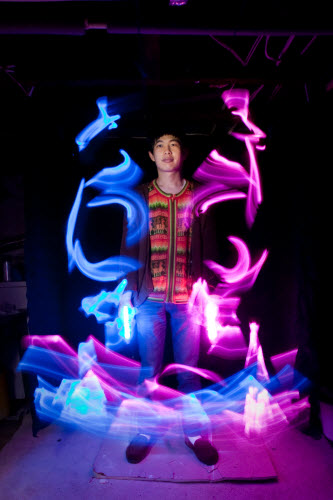| « Making Their Own (Art) History | Hear Sonic Youth Play Smartbar in 1985 » |
Interview Mon Sep 10 2012
Interview: Dustin Wong's New Dreams
By Ben Wilkes
Many alternative music fans are familiar with Dustin Wong, whether they know it or not. Formerly the lead guitarist and a key creative force behind the frenetic art punk of Ponytail, a Baltimore 4-piece that grew from its roots as a Maryland Institute College of Art class project, Dustin is no stranger to experimentation. A maestro of the loop pedal, in his solo work, Dustin layers intricate guitar melodies in real-time to construct cathartic soundscapes that challenge the conventions of songwriting. His February 2012 release, Dreams Say, View, Create, Shadow Leads, on Chicago's Thrill Jockey Records, breaks new ground for him as a musician and for us as listeners, bearing witness to orchestral, psychedelic swarms reminiscent of the greatest electronic and classical composers.
Dustin kicks off a North American tour supporting Beach House on Thursday in Richmond, VA, but he will first stop in Chicago tonight. Dustin is headlining a free show tonight at the Empty Bottle, starting at 9:30pm, that features local acts Bitchin' Bajas and Axis:sovA. For fans of jazz to noise, a live performance that builds elaborate walls of sound brick by brick is surely not one to be missed. I had the chance to chat with the humble, passionate Dustin about his new album, upcoming tour, and how Tibetan monks influence his songwriting process.

Dustin Wong (Photo by Valerie Paulsgrove)
Gapers Block: When Ponytail was on hiatus in 2010, you had the goal in mind of starting this solo project; Infinite Love came out in the midst of all that. However, I feel like the work you did with Matt Papich in Ecstatic Sunshine sounded more like the direction you would eventually take. Did you have lingering inspiration from that body of work? Where does your solo work fit in?
Dustin Wong: Everything is all connected. Ponytail, Ecstatic Sunshine, my own music; it's all a string of interests in variation. My favorite instrument and the only instrument I can really play is the guitar. So, it's how I can push the boundaries with that instrument. With Matt, it was how could I make this interesting with just two guitars. With Ponytail, it was what do these two guitars sound like with a drum and singer. Now in my own work, it's how does a melody work on top of another as a single idea; that can't really change sequentially, more in a vertical way. My challenge was to make melodies activate each other in a way that they can move both horizontally and vertically.
GB: It seemed to me like Infinite Love was an explosion of creative expression you'd been holding back for a while, thus it's drawn-out, orchestral nature. What was your thought process going into Dreams Say, View, Create, Shadow Leads? You broke ideas down a little more, to be more focused? Or more accessible?
DW: I don't really think about whether it's gonna be accessible or not. Don't get me wrong, there's a part of me that really loves pop music. That being said, I love experimental music too. No matter what, I love hooks - that thing that grabs you. It could be any part of your body, soul, or spirit. On Dreams, I went a little deeper: the time signatures and counterpoints are a little more involved. There are a couple songs on that album that were in 6/6 or 3/4, for example.
GB: I know when I write music, granted it's mostly of the punk persuasion, I usually hear the song idea in guitar/ drum combinations. I was curious how you constructed these songs, do you hear the layered crescendo/ climax first or do you build it up piece by piece?
DW: [nodding his head] The first idea is always an idea. What song could come from this idea? I'd like to start a song this way. Then after that, I have no idea where it might lead. It's a lot like starting a painting or a collage, you want to start with this one image, or color, or mark, but who's knows where it's gonna lead. It might be terrible or it might be something.
Dustin Wong - Pink Diamond from Thrill Jockey Records on Vimeo.
GB: Your mode of expression focuses more on sonic layers than lyrics. What role do you think lyrics play in music? Do you think instrumental sound can deliver a similar message in a different way?
DW: I love vocals. Lyrics are, when used well, so fantastic. The music can be really stripped-down and the words can do the work. Even in languages that you don't understand, the textures and vowel sounds can add so much to that music. It's something that's really hard to re-create through instruments - the human voice. It's so special. I definitely want to explore it more though. There's one song on Dreams that I did use them in. But there's also something about taking all that away that allows the listener to explore something else, their imagination. When you use the voice, it grounds the music to this earthly realm, which is a great thing. But when you take that away, it allows the music to go somewhere else, a fantasy realm.
GB: Can you point to any influences for this unique style you've developed?
DW: All over the place really. Les Paul is a big one because he's a pioneer in overdubbing, like 4 or 5 layered guitar melodies, and speeding the guitar sound up so it doesn't even sound like a guitar anymore. People using tapes — the BBC Radiophonic Workshop; using objects and creating those objects as ways of creating melodies. The German guys — Eroc &mdsah; his first album. Just a lot of doo-wop too.
GB: How do you place your music among what else is going on right now? It seems to flirt with the boundaries between art rock and post-rock. Is there a new genre coming out of this?
DW: Rather than the way the music is heard, for me, it's more about how the music is played. I feel there's an allegiance of musicians now, those who work individually. I write my own music and I make my own music by myself. No matter what it is, a sample-based DJ or me, everybody will find their own center. They'll make their own world - and that's where I feel like we're heading now. People are going to create their own sounds. Rather than genres, it's their music.
GB: The upcoming tour with Beach House is pretty exciting, with some good opportunities for exposure. Is that based on a friendship or a hometown allegiance? Baltimore's got a great experimental scene, is it tight-knit?
DW: Well, when Beach House was coming up, Ponytail played their first show with them. It was at this café/ restaurant called Golden West. Ecstatic Sunshine played a couple shows with them because we were on the same label at the time. Good people. They took off really quickly as a band; their first album got picked up by a lot of people. But in the underground, the Baltimore scene in general, there are a lot of awesome people who are too shy to really make their name known, they don't play it out as much as some bands do. It's a way of preserving themselves. The scene's really down to earth.
GB: Obviously a lot of people seem to like the new album, but one criticism that I've heard repeated is that there's almost too much going on, that there are so many mini-climaxes and pay-offs that it almost cheapens the whole. That the song builds to a point where the listener thinks "Yeah! This is the highlight!" then you break it all down and start over. Could be frustrating as a listener. I'm wondering how you would respond to that sort of criticism.
DW: It's easy to end a song. We've heard endings before. You can imagine how a song could end and I just didn't want to go there. You know those sand paintings that Tibetan monks do? When they're done they destroy it right afterwards. I really like that process; you don't really have to preserve something. Making something, breaking it down, and then making something again. Once you create something beautiful, then you can get into the realm of conserving something. Tradition is really important to me, the way of life, keeping that, but it's also important to keep it going, keep it changing. That's kind of my metaphor for myself: let's not stop there, let's begin.
Dustin Wong headlines a free show tonight at the Empty Bottle, 1035 N. Western Ave., with Blues Control, Bitchin' Bajas and Axis:sovA opening, starting at 9:30pm.
About the Author: Ben Brock Wilkes is a freelance journalist and musician from Richmond, VA. who just moved to Chicago and discovered last night it's eight blocks to a mile.















